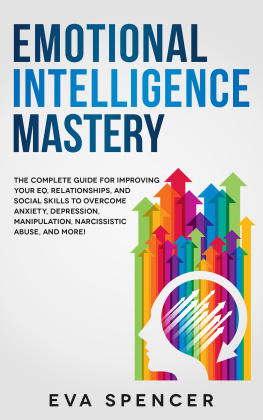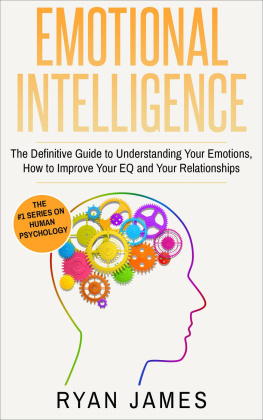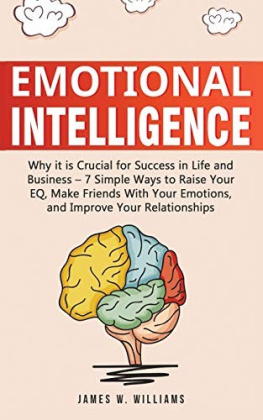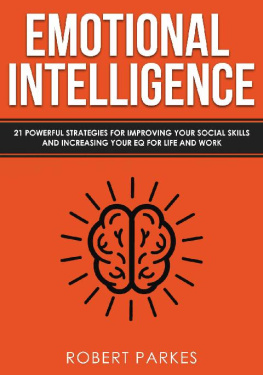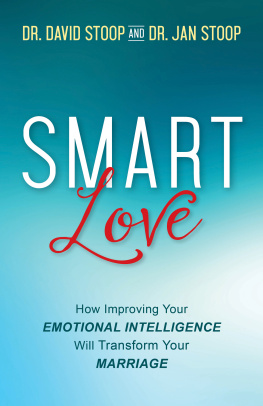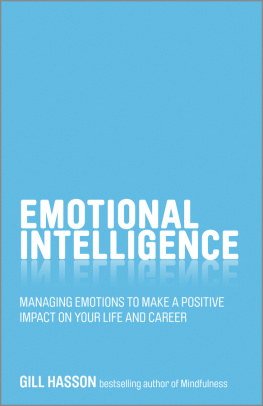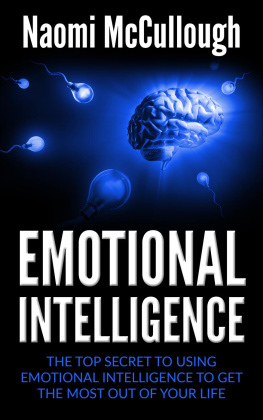EMOTIONAL INTELLIGENCE
8 AMAZING WAYS TO INCREASE EMOTIONAL INTELLIGENCEAND IMPROVE YOUR EQ
By Brenda Roberts
Published by Amazing Publisher atSmashwords
Copyright 2016 Brenda Roberts
Copyright Notice
Copyright 2016 by Amazing Publisher- Allrights reserved.
This document is geared towards providingexact and reliable information in regards to the topic and issuecovered. The publication is sold with the idea that the publisheris not required to render accounting, officially permitted, orotherwise, qualified services. If advice is necessary, legal orprofessional, a practiced individual in the profession should beordered.
- From a Declaration of Principles which wasaccepted and approved equally by a Committee of the American BarAssociation and a Committee of Publishers and Associations.
In no way is it legal to reproduce,duplicate, or transmit any part of this document in eitherelectronic means or in printed format. Recording of thispublication is strictly prohibited and any storage of this documentis not allowed unless with written permission from the publisher.All rights reserved.
The information provided here in is stated tobe truthful and consistent, in that any liability, in terms ofinattention or otherwise, by any usage or abuse of any policies,processes, or directions contained within is the solitary and utterresponsibility of the recipient reader. Under no circumstances willany legal responsibility or blame be held against the publisher forany reparation, damages, or monetary loss due to the informationherein, either directly or indirectly.
Respective authors own all copyrights notheld by the publisher.
The information herein is offered forinformational purposes solely, and is universal as so. Thepresentation of the information is without contract or any type ofguarantee assurance.
The trademarks that are used are without anyconsent, and the publication of the trademark is without permissionor backing by the trademark owner. All trademarks and brands withinthis book are for clarifying purposes only and are the owned by theowners themselves, not affiliated with this document.
Disclaimer
While all attempts have been made to verifythe information provided in this book, the author does not assumeany responsibility for errors, omissions, or contraryinterpretations of the subject matter contained within. Theinformation provided in this book is for educational andentertainment purposes only. The reader is responsible for his orher own actions and the author does not accept any responsibilitiesfor any liabilities or damages, real or perceived, resulting fromthe use of this information.
Table of Contents
Introduction
Congratulations for downloading EmotionalIntelligence; 8 Surprisingly Effective Ways To Increase EmotionalIntelligence.This is your first step towards mastering the art ofmanaging your emotions and unlocking the success that comes withsuch control. Emotional Intelligence involves the ability toidentify, understand, manage and react to different emotions.
Emotional intelligence is also referred to asEmotional Quotient (EQ). EQ is divided into two major parts, whichinclude understanding yourself and understanding others. Improvingyour EQ involves understanding your emotions; managing thoseemotions; motivating yourself; identifying and understanding otherpeople's emotions; and managing your relationships.
Rules for evaluation in the modern world havegreatly changed and thus you will find yourself being judged inspecial yardsticks. You are not only likely to be judged by yourcompetence, skills or anything you were taught in class. Whether atwork, learning institution or even in your personal life, peoplewill judge you using your ability to deal with your emotions andrelate to others.
This may come as a shock to most people whowere taught that academic intellect excellence is all it takes tobecome successful. The success of your career as well asrelationships is highly dependent on your people skills, alsoreferred to as your Emotional Intelligence (EQ).
Researchers even suggest that EQ is a muchgreater determinant of ones success than IQ. You might have eventhought that people who get so much done and are generallysuccessful have a high IQ or smart. This is not true; in fact,people with a very high IQ often have so much on their mind at onegiven time that they are usually not very productive. EQ on theother hand helps you stay in touch with emotions and since life isall about relationships. People who can build and maintain goodrelationships, both professional and social, are usually happierand they also tend to get things done more efficiently thusattracting success.
You experience over 456 emotions on a dailybasis and managing all those emotions can be challenging. Somepeople have more difficulty in understanding and handling theiremotions more than others. In a workable market where permanentemployment is rapidly being replaced with portable skills, having ahigh level of EQ is essential to ensuring that you are and remainemployable.
Whether you are applying for a job or you arealready employed, whether you work for yourself, a smallorganization or a large corporation, you will be scrutinized usingthe EQ lens.
Unlike IQ that stops improving or onlyimproves marginally after an individual attains 18 years of age, EQhas been noted to improve with age for most individuals. Theassumption is that the longer one lives, the more emotionalchallenges they face and this improves the way they handle theiremotions and those of people around them. It is, however inaccurateto assume that the older someone is the higher his or her EQ willbe as there are other factors that contribute to the development ofones EQ.
The average EQ of the American population hasbeen improving gradually over the past years. However, that ofAmerican children and young adults has declined notably. Thisdecline has given rise to concerns since the affected populationplays a big part in the countrys current and future growth. Theever-improving technology has given rise to a generation with verypoor interpersonal skills. Most people would rather chat virtuallythan talk to someone sat next to them.
So what does a higher EQ get you?
As pointed out earlier, a high EQ helps youto recognize and understand your emotions, which in turn helps youto manage your emotions and your relationships. Lack of theseskills result in strained relationships due to factors such as poorcommunication, insensitivity to other peoples emotions, andirrational actions among others. People are naturally wired to seekpleasure and avoid pain such as a strained relationship.Consequently, people who have poor EQ are likely to lead unhappyand isolated lives.
Individuals with low EQs stereotypicallypossess a number of common negative traits. For instance, they arerigid and they possess poor interpersonal which often createsproblems in their personal and professional relationships. Peoplewith high EQ on the other hand, tend to engage with others moreeffectively and they are often better decision makers.
Authors of The Business Case for EmotionalIntelligence, Joshua Freedman and Todd Everett, conducted an EQresearch, which suggested that improving EQ of business leadersfosters a culture of high performance thus increasing theorganizations productivity and profitability.
EQ is what differentiates world-classperformers from mediocre ones. A high EQ also comes with otherpositive qualities including:
A sense of satisfaction.
The flexibility to adapt easily to change as well aslearn new things.
Passion for living and have fun.
Ability to cope with stress and recover fromadversity.


